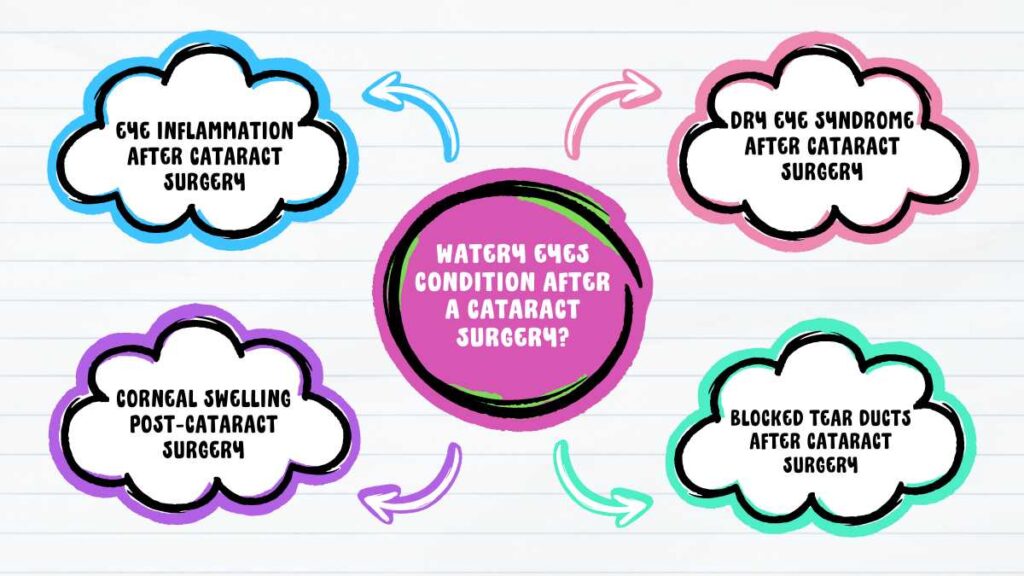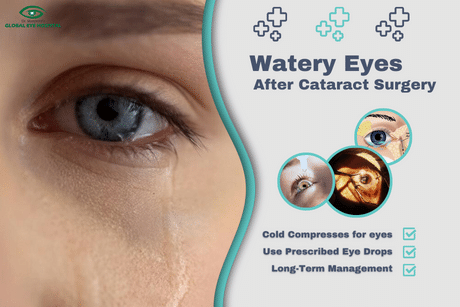Cataract surgery (Motiyabind Operation) is something that most of us need to undergo at some point in our lives. Remember, cataract are often age-related eye diseases, and people tend to develop cataract in the later part of their life span, say in their 50s and 60s. Surgery remains by far the best treatment for cataract. However, the road to recovery can sometimes be littered with unforeseen side effects, one of which is watery eyes after cataract surgery. This occurrence can create anxiety and pain among cataract patients & their families. With Input from Dr Manpreet Singh, the best cataract surgeon in Patiala, Punjab, we aim to help such patients by investigating the causes of watery eyes after surgery. The aim is to address these common concerns in an informed manner with the guidance of an expert eye surgeon from Global Eye Hospital Patiala.
What is Watery Eyes condition after a cataract surgery?

Epiphora, often known as watery eyes, is a condition that can arise when there is an excessive production of tears or a blockage in the drainage system of the tears. This syndrome can appear after cataract surgery for a variety of causes, ranging from straightforward to relatively complicated ones. A list of probable causes of watery eyes after your cataract surgery is as follows.
- Eye Inflammation after Cataract surgery
In the aftermath of cataract surgery, it’s not uncommon for the eye to react by becoming inflamed. This inflammation can stimulate the lacrimal glands to produce more tears than the eye can effectively drain, leading to watery eyes.
- Dry Eye Syndrome after cataract surgery
Paradoxically, dry eyes can lead to watery eyes. When the eyes are dry, they may overcompensate by producing an excess of tears, a condition known as reflex tearing. Cataract surgery can exacerbate dry eye symptoms, especially in the initial healing phases.
- Corneal Swelling post-cataract surgery
The cornea may swell post-surgery, a condition known as corneal Edema. This swelling can irritate the eye, prompting an excessive tear production response.
- Blocked Tear Ducts after Cataract surgery
Though less common, surgery can sometimes lead to blocked tear ducts, preventing tears from draining properly and causing them to overflow.
How to Treat Watery Eyes?
First Response:
For immediate relief, the following steps could be considered for reducing the severity of a disease or condition
- Cold Compresses for eyes: Gently applying cold compresses intermittently can reduce inflammation in your eyes and give instant relief.
- Use Prescribed Eye Drops: Prescribed anti-inflammatory and lubricating eye drops from a qualified eye specialist can give symptomatic relief.
- Long-Term Management. Your eye consultant can draw a plan to devise a long-term management strategy for watery eyes after cataract surgery.
For chronic or recurring cases, a detailed medical intervention is required. That may include
- Use of Punctal Plugs: To keep the eyes lubricated, they are placed into the tear ducts to slow down the flow of tears.
- Duct Probing: A surgeon does an intervention called probing to clear the tear duct obstructions in cases of clogged ducts.
- Advanced medical treatments: for chronic or Persistent watery eye conditions, you are advised to consult an ophthalmologist. They dig deep to fix the primary or associated causes of watery eyes with specialized treatments.
How to Prevent Watery Eye Condition?
While it is not possible to prevent each case of watery eyes following cataract surgery, there are specific measures advised by eye doctors to reduce the risk:
- Pre-Surgical Assessment: A thorough examination can help identify potential risks, allowing for preventive steps.
- Following Post-Op Instructions: Adhering to your doctor’s advice on eye care post-surgery is crucial.
- Regular Check-Ups: Keep up with your scheduled follow-ups to ensure any emerging issues are caught early.
Blog Summary: Watery Eyes After Cataract Surgery
“Watery eyes following cataract surgery are often a temporary hurdle on the road to your vision recovery. Understanding the underlying causes and appropriate management by your surgeons can significantly alleviate discomfort and improve surgical outcomes“, Says Dr Manpreet Singh – senior cataract surgeon at one of the Best Eye Hospital in Patiala. Remember that getting clear vision after cataract surgery is a journey that you and your eye doctor take together. For the best results, follow your surgeon’s advisory faithfully. Adherence to post-surgery care can and does significantly reduce any potential eye complications, including watery Eyes After Cataract Surgery.

